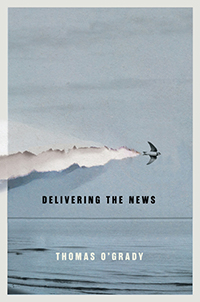Reviews
Poetry Review by Mo Duffy Cobb
Thomas O'Grady, Delivering the News (Montreal: McGill-Queen’s, 2019). Paperbound, 92 pp., $16.95.
 “Today I planted poems — / dung, knife, seed: / a field my page / my pen a spade.” In this dedicatory epigraph from Michael Harnett’s sonnet, “Dán Práta,” Thomas O’Grady sows the seeds of this incredible collection of lyric poems. Delivering the News is an enjoyable read from start to finish, planting the reader directly in the middle of a multitude of natural settings, from the calm of daybreak to “the infinite density of a soul.”
“Today I planted poems — / dung, knife, seed: / a field my page / my pen a spade.” In this dedicatory epigraph from Michael Harnett’s sonnet, “Dán Práta,” Thomas O’Grady sows the seeds of this incredible collection of lyric poems. Delivering the News is an enjoyable read from start to finish, planting the reader directly in the middle of a multitude of natural settings, from the calm of daybreak to “the infinite density of a soul.”
O’Grady was educated at the University of PEI, University College Dublin, and the University of Notre Dame. Structured between Part One, “Seeing Red,” an allusion to growing up on Prince Edward Island (“the heartening blaze / of red that frames the doors, / the eaves, the corner trim / of every outlying / Island barn and shed”) and Part Two, “The Wide World,” which explores other geographies, cultures, and mythologies, O’Grady’s book is nicely rounded with over forty poems. The title poem, “Delivering the News,” immediately draws me in, taking me back to my own grade-six paper route in a Charlottetown of the late eighties, with the familiar tones of those “wild March days” and the soggy canvas sack that “held rain like a tent and hung so low it thumped.”
Moments of realization are captured with both simplicity and depth, inviting the reader in as the author revisits his past, ponders time, and circles back, as in “The Goal”: “How the worn wool jersey of time unravels / As step by steep step we skip up the stair / How they become me in their puckish glow, / And I my father forty years ago.” O’Grady also spends a fair chunk of time on the farmlands and shorelines of his youth, which casts a magical sheen for the reader. In “Picnic Rock” the author contemplates an old photo from 1964:
How the shutter’s blink stops the lapping tongue
of tide and time, the bite of sea on land.
Can a poem’s lie keep my parents young?
Words erode into brine-washed grains of sand.
While much of the text seems simple in form, the accessible couplet, the elegiac quatrain observing the iambic pentameter of O’Grady’s Irish forefathers, the words themselves are tangled from the stress of aging, and the complexities of grief. From “Straighten Up and Fly Right”: “What if I had succumbed to some gaudy / Gordon’s will-withering get-hither gaze / and thus whiled away the rest of my days / a sculpted hunk … / just one more hard body?” The internal rhyme of the verse lends itself to a musicality when read aloud though, and in “Blue Note Cats” we meet his feisty feline, Coltrane. O’Grady’s love for music presents all across the work, from his favourite lines of songs, to descriptions of “Stan Getz guesting on tenor” to “the cascading rush / of notes arranged to hush the restless” in “Doubling on Brass.”
Although the book is steeped in grief, it is also punctuated with the prolific energy of life. The pace quickens in the small section, “Ornithology.” The five poems in it correspond to the poet’s observations of nature, and echo the work of Seamus Heaney, in memory of whom the book is dedicated. From the “muted cacophony” of “Mourning Doves,” through “a lightning streak, an electric / strike across blue sky,” and on to the end of life in “Morrígan”: “Death’s dark draw: how I watched, transfixed, / six raucous crows, their blood dipped beaks / bright nibs, rip apart / from pulsing part of frog, / a tight closed fist of flesh, a throbbing heart.” O’Grady deals with the transmigration of souls so evenly in the book, there is never time for spiritual upheaval.
Quietude resonates with four poems midway in the collection (“How It Ends,” “Letting Go,” “Outside the Wake,” and “Thaw.”) and the reader pauses with respectful distance. The assonance in their lines add rhythm to the breath of the work, (“my stumbling drop of a cumbersome box” and again, O’Grady lets the light in through the cracks in these small, touching moments. From “Letting Go:”
Hearing being the final sense to fail,
We huddled together bedside, her breath
growing short, and taking turns told one tale
after another—laughter defying death.
We get a glimpse of the poet’s private life in “Bedroom Suite,” with all the charm and fullness of domesticity, and a good laugh in “Time Was, When I Sported.” Currently, O’Grady is Professor of English and Director of Irish Studies at the University of Massachusetts Boston, where he has taught since 1984, so I enjoyed this small autobiographical statement in “Maynooth, 1822”: “For scorn from scholars huddled by a hedge, I teach / the art of life; a ruined poet, now / a spoiled priest, I talk in tongues and bow / my head: O sing in me Muse!”
Delivering the News carries with it a few absolutely beautiful lines that merit a re-read. The reverberations of my dear Prince Edward Island aside, I loved the musings on the infinite and the electric pulse of the natural world, life, death, and rebirth.
—Mo Duffy Cobb









